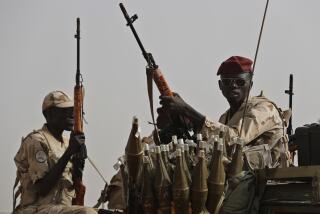Sudan President Bashir scrambles to save regime
His nation on the verge of shrinking, and trouble unfolding in every direction, Sudanese President Omar Hassan Ahmed Bashir is playing warrior and diplomat in efforts to keep his supporters loyal and his economy from collapsing under huge debt.
Bashir’s northern troops unleashed weeks of bloodshed and remain massed in the Abyei oil region near the soon-to-be independent southern Sudan. His soldiers further stunned the international community when they swept into nearby South Kordofan state and the Nuba Mountains to attack tribesmen accused of fomenting insurrection.
This week, with villages burning on both sides of the border that divides northern and southern Sudan, Bashir flew to China to convince his country’s largest trading partner that the 67-year-old president is in control. That proved to be difficult, however, when he arrived in Beijing a day late after his plane was rerouted to avoid flying over Turkmenistan, which might have arrested him on a war crimes indictment from the International Criminal Court, or ICC.
Anxiety brims in Khartoum, Sudan’s capital. The ruling National Congress Party has been unable to stem inflation, and Bashir’s political mastery appears to be fading. The former paratrooper, who seized power in a 1989 coup, is increasingly isolated and has largely failed to impose the north’s corrupt government and Islamic ideals on the south and other non-Muslim parts of the country.
“With an indictment that continues to complicate his leadership, Bashir is indeed an embattled president,” said Zach Vertin, an expert on Sudan for the International Crisis Group. “Infighting between party elites continues … and some see the indicted leader as a growing liability.”
Sudan is a map of enduring crises. Southern Sudan, after decades of civil war that took more than 2 million lives, gains independence July 9. About 75% of Sudan’s oil reserves are in the south and Bashir’s north could lose billions of dollars a year in revenue. He is also attempting to crush separatist ambitions in South Kordofan, Blue Nile state and the Darfur region, where the ICC has accused him of genocide.
The army’s recent air and ground assaults on Abyei and South Kordofan, which killed civilians and forced more than 100,000 people to flee their homes, were seen as a gambit by Bashir to strengthen his hold near the contested oil region to win concessions from the south. Khartoum is in desperate need of money to reduce a $40-billion national debt.
The south, which is controlled by the Sudan People’s Liberation Movement, needs the north’s pipelines to transport the oil. The two sides have yet to reach an agreement to share revenue from the country’s production of about 500,000 barrels a day. Bashir has threatened to shut off the pipelines if the emerging independent south does not pay substantial fees.
“President Bashir knows very well that the survival of his regime depends on oil, and the oil is going to be lost. He knew he needed to indulge himself in a war with the south,” said Alhajj Hamad, a political analyst. “Now he is getting only 37% of the oil revenues. That is barely enough to pay the staff. Food prices are soaring in the north and the mood in the streets is heading toward revolt.”
Hence Bashir’s trip this week to China, which was akin to a man trying to make sure his lover doesn’t stray. Beijing has invested heavily in Sudan’s oil, construction and agriculture industries. In return, Bashir has allowed thousands of Chinese workers into the country and has bought hundreds of millions of dollars in weapons from his partner. But the prospect of an independent southern Sudan is shifting Beijing’s attentions as it seeks resources to fuel China’s expanding economy.
“China wants to win the oil in the south at a time Western countries also see the south as ripe for investment,” said Hafiz Mohammed, an analyst in Khartoum. “The north by itself has little the Chinese can benefit from. But China knows that good relations between north and south are important for the stability of the oil refineries.”
China National Petroleum Corp. already pumps much of southern Sudan’s oil. The official New China News Agency reported Wednesday that although Beijing is “maintaining traditional ties with the north of Sudan, China has worked to develop friendly exchanges and expand mutually beneficial cooperation” with the south.
Bashir and militias aligned with the Sudan People’s Liberation Movement reached an agreement Tuesday that may calm the fighting in South Kordofan. The pact calls for tribesman to disarm and be absorbed into Sudan’s army. South Kordofan is in the north, but many of its militias fought against Bashir’s forces in the civil war that ended in 2005. The sides also agreed to cooperate in overseeing contested border regions.
The U.S. has been pressing Bashir to allow southern Sudan to secede peacefully. As an inducement, Washington has said it would lift some trade sanctions against Sudan and remove the country from a list of states that sponsor terrorism. But Bashir’s defiance against the ICC indictment and his recent attacks along the border suggest that mistrust between Sudan and the West runs deep.
Sudan must choose “a path of normalization or one that leads to continuing international isolation,” Vertin said.
Times staff writer Fleishman reported from Cairo and special correspondent Ahmed from Khartoum.
More to Read
Sign up for Essential California
The most important California stories and recommendations in your inbox every morning.
You may occasionally receive promotional content from the Los Angeles Times.











